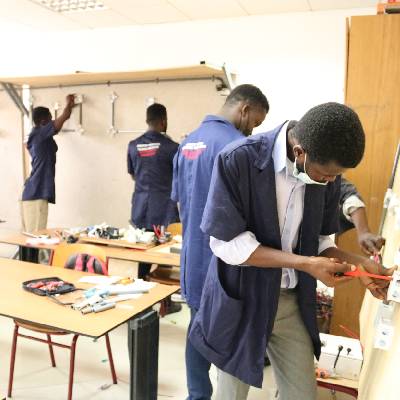
Electrical engineering is the design, building and maintenance of electrical control systems, machinery and equipment. Some electrical engineering concerns are also found in mechanical and civil engineering.
The term electrical engineering often includes electronics engineering. While electrical engineers mainly focus on large-scale production and distribution of electrical power, electronics engineers are concerned with smaller electronic circuits and often also work with computers and other modern technologies. However, any undergraduate course will include elements of both electrical and electronics engineering.
Electrical engineers work in transport networks, lighting, heating, ventilation, lift systems, power generation and distribution, renewable energy, manufacturing and construction. You will elaborate project plans, estimate project timescales and costs, manage the work of technicians and craftspeople, test installations, analyse data and ensure that health and safety regulations are met.
This electrical engineering course will equip learners with both practical and theoretical knowledge in the field of electrical engineering.
Students will be introduced to the key elements in this field of study, and exposed to hands-on experience with electrical machines, control systems, and more, to ensure they have the capability to contributing effectively to the workforce upon graduation.
Electrical engineers use mathematics and physics principles to design, develop, and assess electronic equipment and systems. You'll have the opportunity to work with a range of technologies, including household appliances, the lighting and wiring systems of buildings, power transmission, telecommunications, and satellite communications. In addition, electric engineers earn some of the highest salaries in the field. If this sounds like the right job path for you, then this diploma will provide you with the skills and knowledge you need to take the first step into this industry with confidence
Target Groups
- Students who wish to be electrical engineers.
- Students in a relevant engineering field.
- Professionals currently working in relevant occupations and who wish to acquire knowledge and skills in electrical engineering.
This course will provide a stepping stone for learners to enter rewarding careers such as:
- Technical Support Engineer
- Service Engineer
- Design/Research Engineer
- Production Engineer
Entry Requirements
The minimum entry requirements for the diploma in electrical engineering course are:-
- Pass in relevant Craft Course, or;
- KCSE Mean Grade C- (Minus), or;
- Equivalent qualification approved by KNEC.
Objectives of Electrical Engineering
This diploma in electrical engineering aims to prepare students with the skills and knowledge required to work safely, accurately, and efficiently in the field of electronics. It provides students with hands on skills and knowledge in the field of electrical engineering. It also provides skilled graduates to different sectors of the electrical engineering industry including telecommunication and networks; and electronics and embedded systems.
After the successful completion of the programme students will be able to;
- Understand the general working of various electronic systems.
- Diagnose technical faults in telecommunication systems
- Maintain electronic systems
- Interpret working drawing with a view of fabricating a given technical part to improve efficiency of the system
- Have acquired safe working attitudes for any working environment
- Modify existing systems to improve efficiency
- Appreciate management and organizational problems and issues in the electronic industry.
What you will study
Module I
- Entrepreneurship education
- Information communication technology
- Communication skills
- Life skills
- Engineering mathematics I
- Physical science
- Mechanical science
- Materials, processes and workshop practice
- Engineering drawing
- Electrical engineering principles
- Electrical installation technology
- Solar installation systems
- Analogue electronics I
- Electrical measurements and fault diagnosis
Module II
- Control systems
- Analogue electronics II
- Engineering mathematics II
- Digital electronics
- Engineering drawing and design
- Industrial programmable logic controllers
- Business plan
- Electric circuit analysis
- Industrial measurements I
- Telecommunication principles
Module III
- Engineering mathematics III
- Microcontroller technology
- Industrial organization and management
- Microprocessor systems
- Estimating, tendering and engineering service s contracts
- Trade project
- Electromagnetic field theory
- Data communication
- Networking
- Communication systems
Related articles
-

A Guide to Civil Engineering Degree and Diploma Programs in Kenya
08-Nov-2025 -

Electrical Engineering in Kenya: A 2025 Guide for KCSE Graduates
08-Nov-2025 -

Mechanical Engineering in Kenya: A 2025 Guide for KCSE Graduates
08-Nov-2025 -

Engineering Courses in Kenya: A Guide for 2025 KCSE Graduates
08-Nov-2025 -

Education Pathways in Kenya — From Basic Education to Tertiary | College Guide
06-Nov-2025 -

The Bird and the Mirror: A Reflection on Identity, Perception, and Illusion
07-Feb-2025
Colleges offering Electrical Engineering

Thika Town
Experts Business College

Thika Town
Thika College of Excellence

Thika Town
Jodan College of Technology

Thika Town
Thika Institute of Business Studies

Nyeri Town
The Nyeri National Polytechnic

Nyeri Town
Dedan Kimathi University of Technology

Nakuru Town East
Rift Valley Institute of Business Studies

Kamukunji


